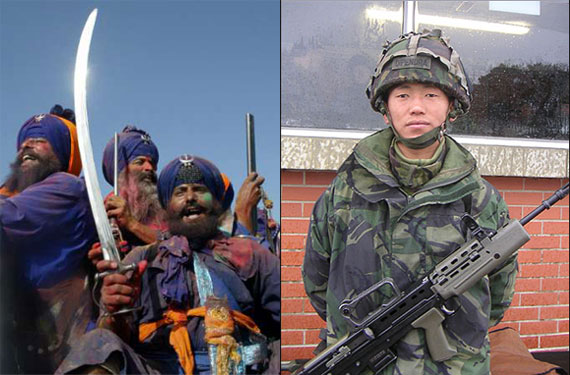11 jul 06
"Who is tougher the Sikhs or the Gurhka's?"

the gurkha has the automatic rifle, but the sikhs are more fired up.
note that they both groups have associated with them blades of some cultural and spiritual importance, although the gurkha kukri saw and sees more action. exception: the stabbing-to-death of indira ghandi by her sikh bodyguards, which may very well have been by sikh kirpan -- seems logical, seeing as the stabbing was religio-political in nature.
but as far as i can tell, the sikh kirpan is 99% symbolic, and is one of the five items sufficiently devout male sikhs carry on their person, the others being breetches (boxer shorts, essentially), a comb, a bracelet, and their well-known long hair (uncut, for a lifetime), wrapped up in a turban.note that the gurkhas and sikhs both have superfluous "H"'s in their names, the placement of which i can never remember.
sikhs are monotheistic, but it's not clear to me if they feel that they're worshipping the same god as the other monotheistic religions. perhaps it doesn't matter -- if two people across the globe say "i worship the one true god", then i think that means that it's necessarily the same god, although they might ascribe to it different properties, behavior, and history; ie, "your god is nice, while my god is mean". that sort of thing.
i don't know much about the gurkas, except that they're nepali hindus with a history of militarism, and, more importantly, have clashed with the sikhs (even though the brittish were using them to do their dirty work). the gurkhas, along with the brittish east inda company, defeated the sikhs pretty harshly in the late 1800s. furthermore, everything i read about them seems to indicate indicates that the gurkas main purpose, in terms of their relations with others, was to be soldiers -- perpetual international mercenaries. a history of the gurkas reads like a military history, even though this is something that is probably true of (m)any peoples, to an extent. but the gurkhas take it to a notably higher level.
this nomadic militarism has put the gurkhas in an awkard position in terms of nationality -- apparently, no one wants them, including nepal.
looking at the sikh's place in history and culture, we see a disproportionate involvement in cetain segments of indian society, namely: politics, sports and the military -- fighting and ruling, basically, which relfects the sort of "hyper-masculenity" that is sometimes attributed to sikhdom. so, the "warrior sikh" hasn't totally passed into history; they join the gurkhas in the ongoing manifestations of toughness, although not quite as much, or as physically/literally.

a sikh kirpan. sorry, i could only find one holstered. underneath the holster, the design varies from kirpan to kirpan. the ones i've seen are sort of squiggly -- you know what i mean; with ripple edges.

a gurkha kukri. fearsome, eh? you can find these in stores like "ranger surplus", for your bushwhacking and beheading needs.
as usual, we can blame the brittish for all of this, "all of this" being the conceptual dichotomy of sikhs and gurkhas, and speculation on their toughness; the brits employed both groups in service in their army, during the days of the brittish empire.
again, i'm not familiar with gurkhas, because you just don't see too many of them around, or at least you don't know who is and who is not a gurkha. sikhs, on the other hand, are immediately recognizable, something that is part of their identity (standing out as a sikh). sikhs are very proud of being sikh, and this identity comes first. that pride and identity form a brotherhood-bond -- i saw a t-shirt once, sported by a sikh, that read "be sikh!".
the gurkas definitely have cooler knives. the kukri is in secular use (i want one now, after seeing it), while the kirpan is strictly ornamental; i found one once on the ground in front of my sikh neighbor's (who works in IT) house, and before i returned it i noticed that it was completely dull. i speculated that once i touched it, it may have been poisoned by pagan hands and would be thrown away, but of course i don't know. perhaps that's unlikely, since part of sikhdom is relgious tolerance -- the ongoing, tiresome, violent, idiotic squabble between indian hindus and moslems (not to mention india vs. pakistan) influenced the sikhs in their being more reasonable in that area.
based on the neighbor working in IT, the gurkhas defeating the sikhs the "sikh wars", and the fact that the gurkhas have cooler knives, i'd have to say "the gurkas". but seriously, the gurkhas seem to me to be, primarily, warriors -- that is their fundamental identity. on the other hand, militarism is only a part of sikh identity. furthermore, the guhrka warrior (mercenary soldier) is still going strong; the "military toughness" of sikhs seems to be largely ritualistic at this point in history. sorry, sikh readers (it's possible).